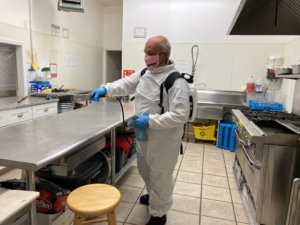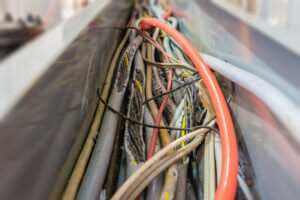As we move through the phases of reopening, there are new standards to consider. Not only do those standards vary by town, let alone by state, they can vary by the day. Hotels are up against their own share of expectations since they often house not only guest rooms but restaurants, entertainment venues, and casinos. With so many different standards for those different industries all under one roof, hotels will have to be extra careful and extra vigilant.
The best thing a hotel manager or owner can do is get in front of it with proper planning. Trying to create a plan late in the reopening game will not likely protect the brand from the exposures that are now a reality for the industry. Additionally, the ever-changing requirements are creating difficulties in making solid business decisions. All planning should remain flexible with “if/then” action plans for various scenarios. The good news is you can focus on the larger issues first so you can deal with the smaller issues as things change. We all know that environmental management and sanitation are going to be the largest issues with the current pandemic, so focusing on these will be a huge step toward reopening.
Clean isn’t enough anymore. There are nuances to the levels of sanitation that you will need to know before people will be comfortable enough to come back to your hotel. Here are 3 tips that can help:
Cleaning -vs- Disinfecting: These are not the same thing. Hotels already have a full-time cleaning crew on staff. Fresh sheets, vacuumed carpet, and fluffy towels are the norm, but we all know we are not living in the norm right now. Cleaning doesn’t kill disease-causing pathogens. However, cleaning staff can participate in part of your sanitation program. Cleaning with the right detergents can effectively force some pathogens down the drain, but Covid-19 has proven that we need more than encouraging those pathogens to move along. So, adding a disinfectant protocol that includes wipe-down and misting to the routine cleaning procedures will aid in eliminating pathogens.
However, cleaning with the right products will only reduce the presence of pathogens. That’s where a professional disinfecting company can be a great addition to a hotel’s sanitation program. Disinfectants are products that actually kill a very high percentage of disease-causing bacteria, viruses, and fungi (pathogens). The EPA has created a “List N” that includes products that meet the criteria for use against SARS-CoV-2, the causing pathogen of Covid-19. While having your cleaning crew wipe down key areas with a product included on the “List N” is important, it will not treat all surfaces. Adding a professional disinfection program on a routine basis, based on your hotel’s specific needs, is essential to treating all surfaces. Misting in addition to wiping down high-touch areas with the correct product can kill 99.99 percent of bacteria, fungi, viruses, and pathogens on hard, non-porous surfaces.
Select the right product: Disinfectants are registered EPA microbial pesticides. There is risk associated with their use. Understanding what is being used, their effectiveness, and relative risks is important to ensure what you use works well while minimizing risks to people and the environment. Much of this information is on the product’s manufacturer’s label, which includes directions approved by the EPA. Unfortunately, they can be confusing. So, here are a few points that are important in considering which product you should select and which company you might chose for professional disinfection.
First off, understanding the toxicity of the product will help you know the risks associated. Disinfectant products are ranked “I” through “IV” (one through four) with “IV” having the lowest toxicity ranking. Toxicity category IV is listed as “practically non-toxic and not an irritant” by the EPA; these of course have the lowest toxicity risks and therefore should be considered if they are also effective against pathogens.
If your main concern in your disinfectant program is Covid-19, the product selected should be included on the EPA’s “List N” of products that meet their criteria for use against SARS-CoV-2. But that’s not the only target pathogen in a good disinfection program. Find a product that kills a very high percentage of numerous pathogens. For example, the product used in the Western PurClean™ disinfectant treatment kills 99.999% of almost 50 bacteria, fungi, and viruses on hard, non-porous surfaces including SARS-CoV-2.
Lastly, there is special consideration you should make if you have a kitchen or if there are food preparation surfaces in your hotel. You’ll want to use a product rated for use on food contact surfaces. Several products are not listed for use in kitchens and can be dangerous (let alone illegal) if used on food contact areas. Again as an example, Western PurClean™ uses a product that is rated “no rinse required on food contact surfaces,” category D2, by NSF International; meaning it’s approved for use in commercial kitchens without the need to wash, rinse, or wipe down the area after it’s applied.
wash, rinse, or wipe down the area after it’s applied.
If you are unable to check off all these boxes yourself, at least make sure to ask the company you are considering to answer these three questions:
- Is the product you use included in EPA’s List-N?
- Is that product ranked a IV in the EPA toxicity category ranking (remember, high ranking is less risk with IV being the least risky)?
- Can your product be used on food contact surfaces and, if so, is it D2 listed by NSF International?
If they can’t say yes to all of those questions, continue your search for a company that can provide all 3 assurances – high effectiveness, low risk, and food surface allowable.
Sanitation IS pest management: Combining cleaning and disinfecting into an overall sanitation program is designed to enhance the appearance of a facility and reduce the risks associated with pathogens. But another added benefit is that sanitation as a whole is a key element in all pest management programs. As a matter of fact, sanitation is one of the two primary preventative principles in pest management – the other being exclusion. This is going to be crucial in ensuring that pests don’t ruin your guests’ experience as you open back up.
Since less people have been coming and going and there have been lower numbers of pest food resources in urban areas (trash locations), pests like rats, flies, and cockroaches have gotten hungrier and bolder. Many have infiltrated spaces like relatively empty hotels to be their harborage locations. All experts agree that we’re likely to have an increase in pest pressure as businesses reopen (which is actually just finding all the places they’ve relocated to). When you do open and start accumulating more trash at your hotel, the flies and rodents will be there, extra hungry. Since there are less garbage locations for them right now in general public spaces, your garbage will be extra attractive to them. People associate these pests with filth, so no matter how clean your hotel may be, if they see pests… well, perception is reality. Having a thorough inspection done by your pest control technician, followed with recommended actions prior to opening, will help identify if and where you’re having any issues in your building and eliminate them prior to a guest finding them for you.
Additionally, we know that bed bugs can go months without feeding and still survive. Even though bed bugs can survive a while without feeding – like during a quarantine – they are extra hungry right now and seeking a blood meal. There are 2 options that can help with bed bug preparation: (1) a bed bug canine inspection to proactively monitor for “hot spots” to treat or (2) your hotel may qualify for the Western Bed Bug Pro365TM proactive bed bug treatment program prior to reopening.
If you’ve found that pests have taken harborage in your unused, quiet spaces over the past several months, there may be facility repairs needed as well. It’s best to find these early on, and your pest control technician should be able to help with that (if you choose the right pest control provider). Some pests like mice and rats are well known  to cause structural damage that can lead to costly repairs. For example, a rat infestation can not only contaminate food and make people sick, but their constant gnawing can lead to frayed wires and fire risks. Having a professional pest company come in and inspect your hotel before you officially open back up will not only identify any pest problems you may have acquired during the closing but can help identify possible structural or safety issues that should be inspected by a professional and addressed prior to opening.
to cause structural damage that can lead to costly repairs. For example, a rat infestation can not only contaminate food and make people sick, but their constant gnawing can lead to frayed wires and fire risks. Having a professional pest company come in and inspect your hotel before you officially open back up will not only identify any pest problems you may have acquired during the closing but can help identify possible structural or safety issues that should be inspected by a professional and addressed prior to opening.
Another important consideration is what happened to the facility outside the front and back doors. Many companies had to make critical cost control decisions, including reducing landscape services. If you let your landscaping go during the shutdown, make sure you start back up and have that landscaper come in and trim overgrown bushes that can be a bridge for pests to reach your hotel and get inside. Have them prune bushes and trees so that no branches touch the building or overhang the roof line. Mow tall grass that could be used as nesting sites for rodents and breeding sites for insects and ensure that at least an 18″ barrier around the perimeter is weed free with mulch pulled back from touching the building foundation. That will help deter termites and encourage them to find somewhere else to do their damage. There are other things you might want to do as well for curb appeal, but these are some primary landscaping activities that can be done to reduce pest pressures as you open.
These tips can help your hotel open up with the confidence that pest risks are minimized and therefore don’t impede any further on the struggles already being experienced by the hospitality industry. You just have to be sure you’re using a professional pest company along with all your other service providers – and even better if you can find one that can offer other services like canine bed bug inspections, proactive management programs, and a professional disinfectant treatment. We mentioned that disinfectants are registered EPA microbial pesticides – which means they are regulated by the same agency that regulates pesticides Western Pest Services already uses. So, it’s logical to have both done by a pest company.
Western Pest Services can provide all three including the disinfecting treatment. And after we disinfect your facility, we’ll give you a certificate and window cling to proudly display. While you want your pest control to be discreet, you will want to shout from the rooftops that you’re having regular disinfectant treatments done. That’s one way we can help protect your brand.
Both your employees that are helping you reopen and the guests that have been waiting for your place to open back up will appreciate what you’re doing. Being proactive can help you get back to business.